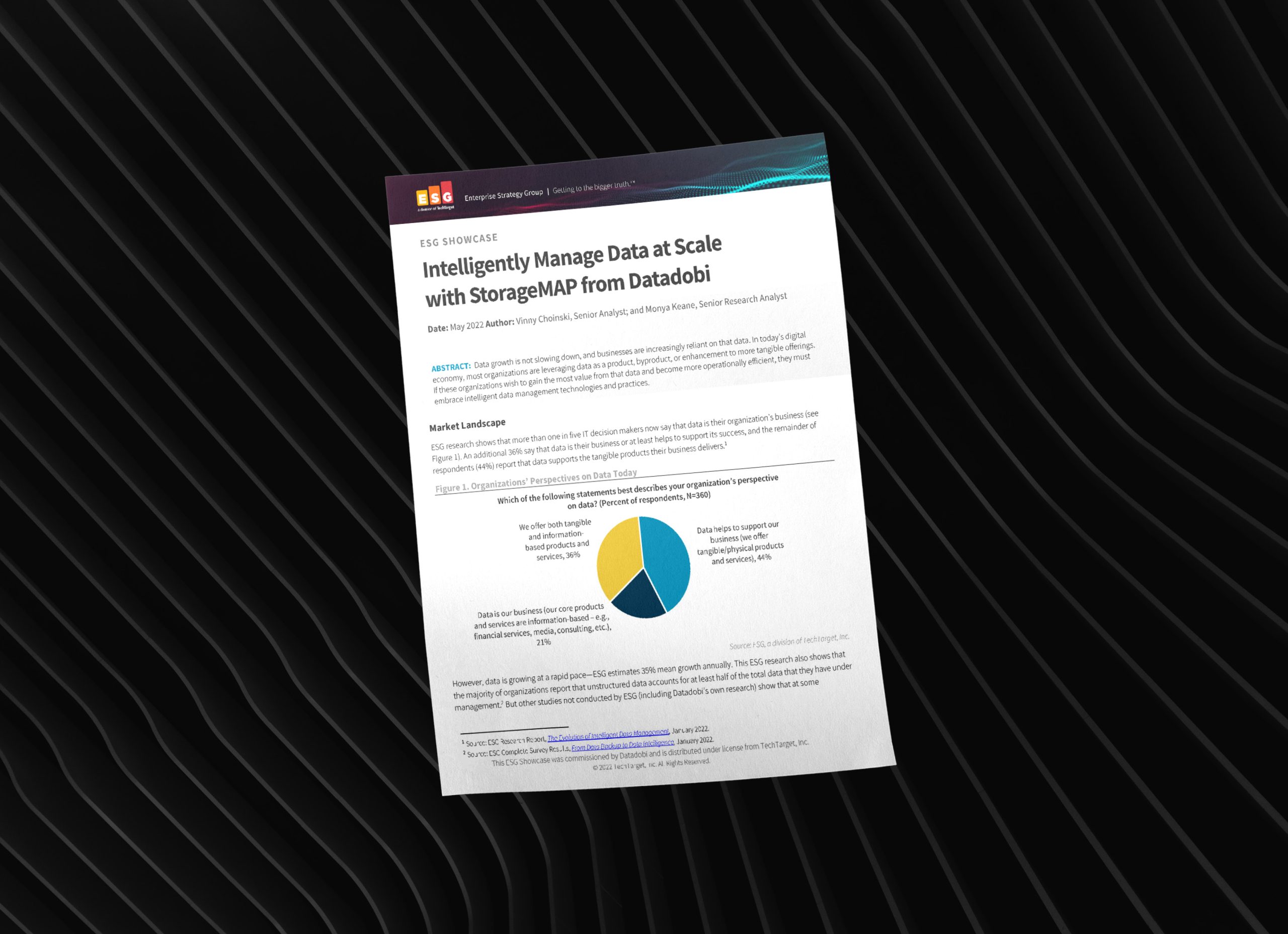Datadobi’s new vendor and cloud-neutral platform helps IT leaders solve cost, carbon footprint, and business risk issues while maximizing the value provided by data
Leuven, Belgium, June 14, 2022 – Datadobi, the global leader in unstructured data management, today released a new report with Enterprise Strategy Group (ESG) Global, an IT analyst, research, validation, and strategy firm owned by TechTarget, that assesses its new StorageMAP solution. The report provides insight into today’s challenges in unstructured data management and highlights how StorageMAP can empower organizations to manage their unstructured data at scale.
More than one in five IT decision-makers now say that data is their organization’s business, with nearly half (44%) of ESG survey respondents reporting that data supports the tangible products their business delivers.
With all data growing at a pace of 35% annually, and up to 90% of all data on an enterprise’s network being unstructured, IT leaders are faced with a number of challenges including the management, optimization, and automation of data placement on storage tier or media, meeting data security and compliance requirements, and hardware costs. Organizations are also increasingly having to manage redundant, obsolete, and trivial (ROT), cold, and aging data on their networks.
StorageMAP, which was made generally available in May 2022, was designed to alleviate these issues and address the top four areas of concern for IT leaders: cost, carbon footprint, business risk, and maximizing the value provided by data.
Built upon Datadobi’s vendor-neutral unstructured data mobility engine, StorageMAP stands out from other IT vendors that claim to offer data management solutions because it is a vendor-neutral end-to-end solution that takes the customer from the discovery of the entire data estate, whether on-premises, remote or in the cloud, through organization into logical business priorities, to taking the most appropriate action all in a single user interface. Unlike backup-based solutions, StorageMAP works on the primary dynamically changing data and is not a point-in-time backup. Additionally, as an out-of-band solution, StorageMAP does not make changes to the existing host-to-storage communication schema or alter the existing storage layer data management schema. Hosts and applications continue to communicate with storage with no impact from StorageMAP.
High-level graphs enable the C-suite to gain an immediate view of their cost and carbon footprint. The IT department or business units can then dig deeper to understand what is driving these costs and carbon emissions to make evidence-based decisions on how to reduce them.
In the report, ESG also affirms that organizations can mitigate risks in terms of poor data security, regulatory non-compliance, inefficient operations, and more by deploying StorageMAP to manage unstructured data at scale.
“Over the past several years, unstructured data has become quite a valuable asset for businesses. However, the sheer volume of data and complexity of modern unstructured data storage environments has caused many IT leaders to struggle under the weight of data-movement decision fatigue,” said Vinny Choinski, Senior Analyst at ESG. “StorageMAP takes the guesswork out of the unstructured data management process and allows IT leaders a single-pane of glass view into their storage network. With the platform, IT leaders can make informed decisions to get the most out of the unstructured data at their disposal.”
“We are in the age of unstructured data. Having the right unstructured data management solution to guide data decision-making processes is going to mean the difference between sinking and swimming in today’s competitive business landscape,” said Steve Leeper, Vice President of Product Marketing at Datadobi. “StorageMAP truly puts IT leaders in the driver’s seat and in control of their data’s cost, carbon footprint, risk, and value and allows them to reap the rewards.”
To download a full copy of the report, click here.

